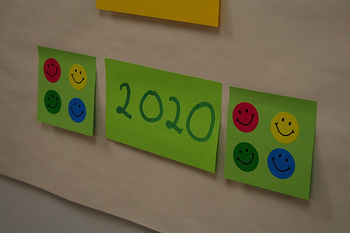Conclusion
| Scenario planning for educators | |
|---|---|
| A manager's perspective of scenario planning | Introduction and objectives | Video signpost | DEANZ Case study | e-Learning Activity: Decision-making simulation | Conclusion | FAQs |
| “ | Prediction is very difficult, especially about the future. | ” |
| —Niels Bohr[1] | ||
The purpose of this section was to simulate the decision-making process based on the reading of selected scenarios to gain insight into what constitutes a good scenario. The idea is that you will use this experience when generating your own scenarios later in this online course. Some learners, may have sourced scenarios which do not facilitate effective decision-making and we invite you to share the reasons why these scenarios were not effective.
| What constitutes a good scenario?
Based on your experiences in simulating decisions derived from scenarios in the previous e-Learning Activity, in your view, what are the criteria for an effective scenario? Share your thoughts on the characteristics or requirements for a good scenario by posting on twitter or WEnotes. Remember to include the hastag "#SP4Ed" in your post, for example:
|
- Plausibility, that is, they must fall within the realms of what conceivably could happen;
- Differentiation, referring to the requirement that each scenario must be structurally different so that they are not simply variations of the same structural foundations;
- Consistency, meaning that scenarios must be internally consistent and not contain rationales that are inconsistent with the main tenets of the respective storyline;
- Decision making utility, to ensure that they can be used productively in determining strategies for the future;
- Challenging, in that they confront existing organisation wisdom about the future.
In conclusion, the art of scenario planning involves a creative process of generating scenarios sets which are equally compelling irrespective of the specific scenario matrix. The "high-road" versus "low-road" approach where attractive futures are juxtaposed against less attractive alternatives can reduce the decision-making utility of the scenarios. Effective scenarios are those which are designed to offer alternatives for success in support of strategic planning which is future focused.
Notes
- ↑ http://www.quotationspage.com/quote/26159.html
- ↑ Wilson, I. 1998. Mental maps of the future: An intuitive logics approach to scenarios. In Fahey, L & Randall, R.M. (eds.) 1998. Learning from the future. Competitive foresight scenarios. New York: Wiley, John & Sons, Inc.
